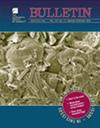贫铜闪锌矿中的富锗纳米颗粒:富集 Ge 的新机制
IF 3.9
1区 地球科学
Q1 GEOSCIENCES, MULTIDISCIPLINARY
引用次数: 0
摘要
锗(Ge)是高科技工业(即光学工业)应用中的一种重要原材料,主要集中在煤炭和富锌矿床中。以往对富锌矿床的研究记录了锗富集与闪锌矿晶格中铜、银和/或铅锰含量之间的相关性。在本研究中,我们观察到位于中国西南部的板边街锌-锗矿床(>800 吨,分级为 ∼100 ppm Ge)中贫铜闪锌矿中富含 Ge 的纳米颗粒。激光烧蚀-电感耦合等离子体质谱(LA-ICP-MS)分析表明,闪锌矿的锗含量非常不均匀(172-1553 ppm)。锗含量与铁、锰和铅含量呈正相关,与镉含量呈负相关。在颜色较深的区域检测到较高的锗含量,而颜色较浅的区域则显示出较低的锗含量并富含镉。利用透射电子显微镜(TEM),在闪锌矿的较暗区域发现了 Zn-Ge-Pb-S 纳米颗粒。这些纳米颗粒的锗/铅比(0.48-1.96)与闪锌矿中测得的锗/铅比(0.36-2.04)非常相似,这表明纳米颗粒中基本上可以容纳锗。我们认为,Zn-Ge-Pb-S 纳米颗粒的数量与晶体快速生长引起的自组织模型有关。这种自组织过程可能会控制边界层中元素浓度的波动。这项研究强调了研究关键元素的纳米级表达以了解其融入天然材料机制的重要性。本文章由计算机程序翻译,如有差异,请以英文原文为准。
Germanium-rich nanoparticles in Cu-poor sphalerite: A new mechanism for Ge enrichment
Germanium (Ge) is a critical raw material used in high-technology industry (i.e., optical industry) applications, and it is predominantly concentrated in coals and Zn-rich deposits. Previous studies on Zn-rich deposits have documented a correlation between Ge enrichment and the Cu, Ag, and/or Pb-Mn contents in the sphalerite crystal lattice. In this study, we observed Ge-rich nanoparticles hosted in Cu-poor sphalerite from the Banbianjie Zn-Ge deposit (>800 t graded at ∼100 ppm Ge), located in southwest China. Laser-ablation−inductively coupled plasma−mass spectroscopy (LA-ICP-MS) analyses revealed that sphalerite contains very heterogeneous Ge contents (172−1553 ppm). Germanium contents showed positive correlations with Fe, Mn, and Pb contents and negative correlations with Cd contents. Higher Ge contents were detected in the darker zones, whereas the lighter zones showed systematically low Ge contents and were enriched in Cd. Using transmission electron microscopy (TEM), Zn-Ge-Pb-S nanoparticles were identified in the darker zones of sphalerite. These nanoparticles exhibited Ge/Pb ratios (0.48−1.96) very similar to those measured in sphalerite (0.36−2.04), suggesting that Ge could be essentially hosted within the nanoparticles. We propose that the amounts of Zn-Ge-Pb-S nanoparticles are related to a self-organization model induced by rapid crystal growth. This self-organization processes may control the fluctuations of element concentrations in the boundary layer. This study highlights the importance of studying the nanoscale expression of critical elements to understand their incorporation mechanisms into natural materials.
求助全文
通过发布文献求助,成功后即可免费获取论文全文。
去求助
来源期刊

Geological Society of America Bulletin
地学-地球科学综合
CiteScore
9.30
自引率
8.20%
发文量
159
审稿时长
4-8 weeks
期刊介绍:
The GSA Bulletin is the Society''s premier scholarly journal, published continuously since 1890. Its first editor was William John (WJ) McGee, who was responsible for establishing much of its original style and format. Fully refereed, each bimonthly issue includes 16-20 papers focusing on the most definitive, timely, and classic-style research in all earth-science disciplines. The Bulletin welcomes most contributions that are data-rich, mature studies of broad interest (i.e., of interest to more than one sub-discipline of earth science) and of lasting, archival quality. These include (but are not limited to) studies related to tectonics, structural geology, geochemistry, geophysics, hydrogeology, marine geology, paleoclimatology, planetary geology, quaternary geology/geomorphology, sedimentary geology, stratigraphy, and volcanology. The journal is committed to further developing both the scope of its content and its international profile so that it publishes the most current earth science research that will be of wide interest to geoscientists.
 求助内容:
求助内容: 应助结果提醒方式:
应助结果提醒方式:


